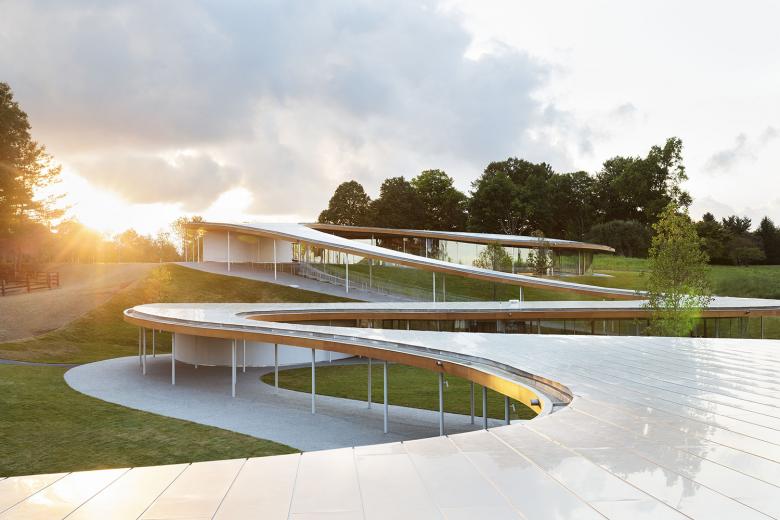Grace Farms River Building
13. octobre 2015
On October 9th the much-anticipated Grace Farms River Building designed by the Pritzker Prize-winning firm SANAA was inaugurated. The building is made up of five glass-enclosed volumes strung together along a sinuous covered walkway that follows the contours of its beautiful Connecticut site. eMagazine Editor in Chief John Hill attended the inauguration and filed this report.
Grace Farms, the River building
The $8.3 million River Building sits on 80 acres of a former farm in New Canaan, Connecticut that the Grace Farms Foundation purchased last decade to, in their words, "support initiatives in the areas of faith, the arts, justice, and community." A major part of the project at Grace Farms, as the property is called, is a new home for the nondenominational Grace Community Church, but the River Building is much more than a place for the congregation to worship. In the words of Grace Farms Foundation President Sharon Prince, it is "a place for all religions, or no religion at all" and "a Type-B experience for a Type-A world." It is a place the public can visit for free with no obligation to do anything beyond simply being within the landscape.
Grace Farms, roofline perspective of the River building and Barns
The Foundation selected SANAA, the duo of Kazuyo Sejima and Ryue Nishizawa, in 2010, shortly before they received the Pritzker Architecture Prize. In 2012 they unveiled the meandering design that recalled previous SANAA buildings, particularly the Glass Pavilion at the Toledo Museum of Art, but also those Oscar Niemeyer realized at Pampulha in Brazil more than sixty years ago. Yet where SANAA stakes out their own claim is in the technical advancements that give the impression that their buildings are lighter than air. The River Building's roof – wood on the underside, metal on top – is as thin in reality as it was in the 2012 renderings, while the crystal-clear curved glass walls effectively disappear at times.
Grace Frams, the River building
With two sets of parking lots, visitors can experience the River Building from the top of the hill down to the bottom (a change of elevation of more than 40 feet) or vice-versa. My visit on inauguration day started at the bottom, where two parallel renovated barn buildings framed the new building in the distance. At the bottom of the River Building was the Court, a multi-purpose gymnasium that sunken into the ground to reduce its height within the landscape. Next was the small Pavilion that serves as a Welcome Center and a great place for some green tea. Further up the hill were the dining Commons, then the Library with offices, and finally the Sanctuary, where Prince, Sejima, Nishizawa and others spoke about the building that was still getting its finishing touches the day before. Most memorable were Sejima's sincere comment that the land is one of the most beautiful sites they had ever seen, a sentiment echoed by religious scholar Miroslav Volf, who found the building to be a "uniting of God's delight and human being's enjoyment of the world."
Grace Farms, the River building, Commons
The most generous spaces within the River Building are the 700-person Sanctuary and the Court. Like the other pond-like volumes under the covered walkway, the spaces are capped by exposed glulam beams, but the beams in these two spaces are so long they had to be shipped by a route around the Rockies from British Columbia. The full-height glass panels were manufactured in Germany and curved in Spain, then assembled on site with the smallest of silicone joints. These exacting details are indicative of those used throughout the project toward increasing the sensation of the building merging with the landscape. A literal merging will occur in planned custom furniture to be made from the trees felled from the site due to the building's construction.
Grace Farms, the River building, Sanctuary
After spending the day at Grace Farms it was easy to sympathize with Sejima about the beauty of the site. Yes, most of the immediate landscape designed by OLIN has yet to take hold, but the surrounding trees in their near-peak fall colors served as an embrace from the lower reaches of the site, while from the Sanctuary the views over the trees gave a sense of something beyond, both in a physical and religious sense. SANAA have done everything right with the siting of the River Building and splitting it up into five pieces. This splitting forces people to move about the pavilions outside, rather than staying put behind glass walls. It is not enough for nature to be an image, it must be something we experience directly as much as possible in our daily lives.
Grace Farms, the River building, Court
Grace Farms River Building
2015New Canaan, Connecticut, USA
Client
Grace Farms Foundation
Architect
SANAA
Tokyo, Japan
Principals in Charge
Kazuyo Sejima & Ryue Nishizawa
Project Team
Shohei Yoshida, Takayuki Hasegawa, Tommy Haddock
Landscape Architect
OLIN
Philadelphia, PA
Principal in Charge
Dennis McGlade
Project Team
Les Bishop, Jen Toy, Eve Kootchick
Executive Architect
Handel Architects
Structural Engineer
Robert Silman Associates
Civil Engineer
McChord Engineering
Sustainability Consultant
Transsolar
Building Envelope
Front
Glazing
Roschmann Steel & Glass
Roofing
Zahner
Acoustics
Harvey Marshall Berling Associates, Nagata Acoustics
Geotechnical Engineer
Langan Engineering
Geothermal Designer
Alderson Engineering
Meadow Consultant
Larry Weaner Landscape
Soils and Wetlands
Environmental Planning Services
Conservation Planning and Herpetologist
Michael W. Klemens LLC
Graphics
Pentagram
Project Manager
Paratus Group
Construction Manager
Sciame
Site Area
80 acres
Building Area
83,000 sf
Photographs
Iwan Baan, Dean Kaufman, courtesy of Grace Farms
Articles liés
-
Spotlight on Italy
on 16/05/2018
-
Bologna Shoah Memorial
on 20/07/2015





